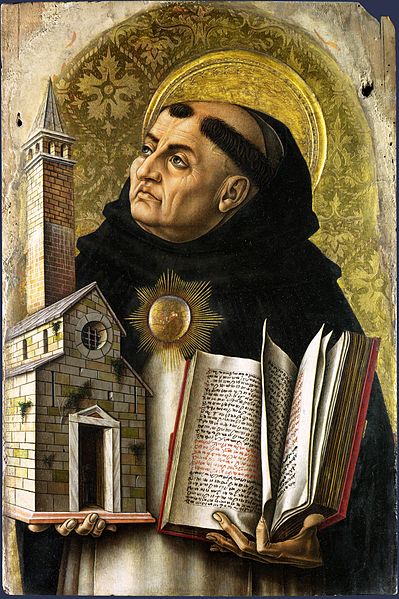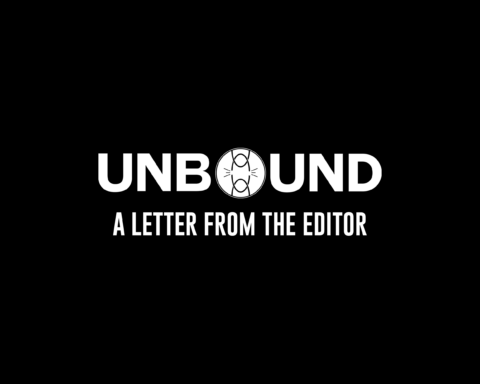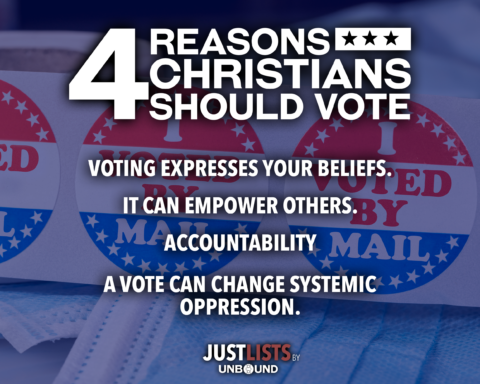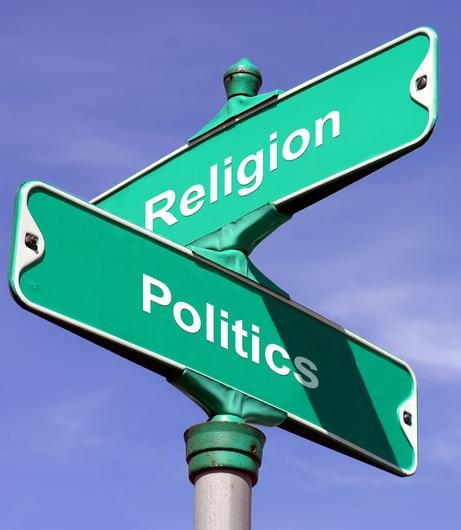
We are in the midst of a strange election season, to say the least. I have heard more people say, “I’m just not voting,” or “I don’t have anyone to vote for,” in this election than in any other in my lifetime.
In an extremely polarized society, perhaps the one thing that most reasonable people can agree upon is the fact that something in the system is not working.
How does a Christian faithfully respond?
As I’ve been working on this issue, I’ve found myself thinking again and again about H. Richard Niebuhr’s 1951 classic Christ and Culture. Certainly it’s imperfect, many would argue incomplete, and undoubtedly dated (much has changed in religion and politics between 1951 and 2016!), But it is still a useful starting place, a compelling framework for understanding the ways people of faith respond to the cultural and political systems in which we operate.
So, whether the following serves as a primer or a refresher, what follows is a synopsis of and brief reflections on Niebhur’s 5 answers to the question, “What is the relationship between Christ and culture?”
___________________________________________
In an extremely polarized society, perhaps the one thing that most reasonable people can agree upon is the fact that something in the system is not working.
___________________________________________
His five choices are:
- Christ Against Culture
- Christ of Culture
- Christ Above Culture
- Christ and Culture in Paradox
- Christ the Transformer of Culture
1.) Christ Against Culture
This answer sees Christ and culture, God and the world, as fundamentally opposed. Niebuhr calls those who fall into this category the “radical Christians” and puts them on one end of a spectrum (the other end being the “cultural Christians, #2 below). The theology of this approach to Christ and culture is best expressed in oppositions like, “there are two ways – one of life and one of death”, or the New Testament’s First Letter of John’s description of the antipathy between God and “the world”. Since culture, including politics, are of the world, they are part of the way of death and should be rejected wholesale. In place of the world, Christ has inaugurated a new way of living that should be embraced wholeheartedly by the community of believers. Into this category, Niebuhr puts Tertullian, Leo Tolstoy, St. Benedict and other monastics, and Mennonites and other “Protestant Sectarians” (a term which, Niebuhr specifies, he does not mean to confer judgment).
 In 2016, this is the Christian who looks at the flawed options and says “I’m not voting”. This is the Christian who cannot compromise on values enough to vote for any candidate. This is the Christian who turns off the television when the debates come on because they know they will hear offensive, self-aggrandizing rhetoric brimming with uncontrolled ego, American exceptionalism, and demeaning attacks on opponents. This can be the Christian who withdraws from society – into their own family, or a church, or a commune – but this can also be the Christian who creates alternative communities and solutions to the problems that our culture and politics are clearly not addressing. This could be the Christian who has given up on Medicaid expansion but is working tirelessly at a free health clinic, choosing an alternative sphere to live out their faith because the political sphere is simply too corrupt.
In 2016, this is the Christian who looks at the flawed options and says “I’m not voting”. This is the Christian who cannot compromise on values enough to vote for any candidate. This is the Christian who turns off the television when the debates come on because they know they will hear offensive, self-aggrandizing rhetoric brimming with uncontrolled ego, American exceptionalism, and demeaning attacks on opponents. This can be the Christian who withdraws from society – into their own family, or a church, or a commune – but this can also be the Christian who creates alternative communities and solutions to the problems that our culture and politics are clearly not addressing. This could be the Christian who has given up on Medicaid expansion but is working tirelessly at a free health clinic, choosing an alternative sphere to live out their faith because the political sphere is simply too corrupt.
Niebuhr sees the practices of withdrawal and renunciation as necessary but incomplete parts of the Christian life. Such an approach ignores our inescapable indebtedness to culture – even the very language with which we discuss Christ is itself a cultural product. He contends that Christian withdrawal from culture, while often drawing attention to the places where reform is needed, fails to achieve any actual reform without the help of Christians who fall into another category. Withdrawal from culture as an end in itself, even a sort of self-purification, leads to moral irresponsibility in this interim, “already/not yet” time between the coming of Christ and the full consummation of the Kingdom. Niebuhr points to the example of Leo Tolstoy who, upon embracing this radical brand of Christianity, renounced the institution of property, and thus the land he owned fell into disrepair. An unknowing peasant crossing Tolstoy’s property fell into a neglected sandpit and was buried alive.
Tolstoy may have kept himself ‘undefiled’ by the world by rejecting the fallen institution of private property, but as a result an innocent person lost their life. How different is this from abstaining from voting, refusing to cast a ballot for “the lesser of two evils”, but therefore potentially allowing the “greater of those two evils” to gain the presidency?
2.) Christ of Culture
Those who embrace this answer, whom Niebuhr calls “cultural Christians”, fall to the extreme other end of the spectrum. For cultural Christians, Christ becomes the Messiah of society itself, embodying the best of humanity and the best of society. Niebuhr identifies a whole host of Christians who operate from this perspective, from first-century Gnostics to Immanuel Kant to Thomas Jefferson to much of twentieth century (and, we could add, twenty-first century) pop theology. But perhaps the classic example is the nineteenth-century “liberalism” exemplified by Albrecht Ritschl or Frederick Schleiermacher, an approach accurately classified as “Culture Protestantism.” Those who believe in the Christ of Culture assume humanity will continue to progress. Harmonizing Christ with culture, they see Christ as the ideal form of humanity, the goal to which we all ultimately aspire. Jesus is the great teacher, the great philosopher, the one who enlightens us and moves us closer and closer to that ideal of peace, moral perfection, and a better society.
 In our current presidential race, this is the Christian who sees their candidate as one who has the capacity to “save” the nation. Yes, much is wrong with our political system, but it can be fixed. Their candidate may not be perfect, but will surely enact God’s purposes in history. We can, and will, move in a dramatically different direction, out of the darkness and into the light. The cultural Christian may appreciate the free health clinic at which our radical Christian works, but ultimately believes that we will progress beyond the need for the clinic at all.
In our current presidential race, this is the Christian who sees their candidate as one who has the capacity to “save” the nation. Yes, much is wrong with our political system, but it can be fixed. Their candidate may not be perfect, but will surely enact God’s purposes in history. We can, and will, move in a dramatically different direction, out of the darkness and into the light. The cultural Christian may appreciate the free health clinic at which our radical Christian works, but ultimately believes that we will progress beyond the need for the clinic at all.
I must admit I fell into this mindset with soon-to-be President Barack Obama in 2008. It was the first presidential election in which I could vote, and here was a candidate espousing hope, peace, bipartisanship. Here was the man who would become the first Black President of the United States. I had the chance to join a historic campaign and cast a historic vote – and I did so with something of a messianic fervor! I don’t regret that vote, nor my activism and campaigning in 2008 or again in 2012. But President Obama turned out to be just that – a president, not a Savior. He approaches the end of his term, in my opinion, as a President who has done much good and some not-so-good while in office. Perhaps a theological pause in early 2008 would have reminded me of that reality. I know from personal experience how easy it is to believe in the Christ of Culture, even if we do not quite state it that way.
___________________________________________
I must admit I fell into this mindset with soon-to-be President Barack Obama in 2008. But President Obama turned out to be just that – a president, not a Savior.
___________________________________________
 As with the radical Christians, Niebuhr believes the cultural Christians offer important yet incomplete contributions. Who can criticize social progress, a more just society, the noblest efforts and institutions of our culture? This position strongly affirms God’s concern for the temporal realm – for the suffering of humans and of Creation in the here and now. It presumes the capacity of human wisdom and achievement to align with the will of God and Christ’s own teachings – does this not point to the fact that God has created us and called us good? Can we not see the divine image in our leaders? In theological terms, Niebuhr sees cultural Christianity allowing for the presence of the “Indigenous Christ” as we learn about Christ in our own language and experience Christian ritual in ways that intersect with our own customs.
As with the radical Christians, Niebuhr believes the cultural Christians offer important yet incomplete contributions. Who can criticize social progress, a more just society, the noblest efforts and institutions of our culture? This position strongly affirms God’s concern for the temporal realm – for the suffering of humans and of Creation in the here and now. It presumes the capacity of human wisdom and achievement to align with the will of God and Christ’s own teachings – does this not point to the fact that God has created us and called us good? Can we not see the divine image in our leaders? In theological terms, Niebuhr sees cultural Christianity allowing for the presence of the “Indigenous Christ” as we learn about Christ in our own language and experience Christian ritual in ways that intersect with our own customs.
Yet faith in the Christ of Culture makes it easy to fashion God in our own image. Christ becomes, in Niebuhr’s words, a “chameleon” that we can fashion into whatever idol we prefer. The Gospel, in turn, seems to change and meld into something that meets the needs of our own time and our own social location. The same elements that allow us to worship God in our own language can also allow us to worship God in our own image.
3.) Christ Above Culture
While Niebuhr calls the first two answers the extremes, the final three answers to the question of Christ and Culture comprise what he calls the Church of the Center; they use different elements from each end of the spectrum in search of a mediated understanding.

Those who espouse a “Christ Above Culture” viewpoint are “synthesists” because they answer the question of Christ and culture with a “both-and” solution. For the synthesists, Christ encompasses the best of culture and then adds to that what culture cannot attain, for there is a gap between the best of human accomplishment and Christ. This is the Christ who, to quote Jesus, “comes not to abolish the Law and the Prophets, but to fulfill them.” Into this category Niebuhr places Clement of Alexandria, who saw the Stoic understanding of a good, virtuous person as a solid start to following Christ, but one that needed to be completed by the higher virtues of Christ. Likewise Niebuhr points to Thomas Aquinas, for whom natural law provided ethical grounding, but for whom the higher, divine law of Christ was needed for a truly Christian life. For Thomas, the great social institutions of culture are valid and defensible, but must be regulated according to the higher revealed ideal of Christ.
In our context, this is the Christian of “both/and”. They will vote for the candidate they think is best – perhaps from a religious rationale, perhaps from a secular. But they will likely not put much faith in the political process itself to bring us the answer we need because it is part of that lower sphere; it can only get us to a certain level as a nation. The synthesist Christian may join our radical Christian at the free health clinic – or any other host of charities – not because they believe the health care system is too corrupted to provide what people need but because that secular health care system can never do enough. There is need for Christian charity, Christian action, over and above the secular political and social sphere. For the synthesist, the need for the free health clinic is not necessarily an indication of a failure in the political system. It’s that the political system could only ever go so far to begin with.
___________________________________________
Niebuhr asserts that there is no one Christian answer to the question. All decisions we make and postures we assume toward the social and political world will inevitably be incomplete, relative, and culturally conditioned.
___________________________________________
 Niebuhr saw much of value in “Christ Above Culture”. The synthesist answer provides solid ground for collaboration on social issues with secular institutions and people of other faiths while still maintaining Christian distinctiveness. Both church and culture are deeply indebted to the synthesists for their contributions to the arts, sciences, economics, etc. However, Niebuhr is quick to point out that the Christ above Culture answer has the perhaps inevitable tendency to absolutize what is relative. This means being aware that the “culture” and “natural law” that any one person names as common sense reason is culturally conditioned. Even if there is a “universal natural law”, the best grasp of our reason is still partial—and not impartial.
Niebuhr saw much of value in “Christ Above Culture”. The synthesist answer provides solid ground for collaboration on social issues with secular institutions and people of other faiths while still maintaining Christian distinctiveness. Both church and culture are deeply indebted to the synthesists for their contributions to the arts, sciences, economics, etc. However, Niebuhr is quick to point out that the Christ above Culture answer has the perhaps inevitable tendency to absolutize what is relative. This means being aware that the “culture” and “natural law” that any one person names as common sense reason is culturally conditioned. Even if there is a “universal natural law”, the best grasp of our reason is still partial—and not impartial.
Most problematic for Presbyterians and other Reformed Christians, synthesist Christians put little emphasis on the total and far-reaching presence of sin and evil in the culture that Christ both embodies and transcends. With the type of rhetoric in this election season, I think most Christians would agree that human sin has been very visibly and gutturally present.
4.) Christ and Culture in Paradox
If we’re looking for an understanding and awareness of human sin, we will certainly find it in those whom Niebuhr calls “Christian dualists”, who see Christ and culture existing in paradox. The dualist sees first and foremost an irreconcilable conflict between God’s righteousness and human sinfulness. Therefore any approach to Christian life must begin with the joyful mystery of God’s gracious act of reconciliation in Jesus Christ. God’s grace and the spiritual realm in which it takes place are the ultimate value and focus of the Christian life. Dualists believe in human depravity as the synthesists never could, for they see all human action (culture included) as infected by sin and godlessness.

Niebuhr points to Martin Luther as the quintessential example of this “dualistic motif”. Contrast Luther’s description of the love, joy, and service of neighbor that flow from Christian faith in his Treatise on Christian Liberty with the rather merciless, Machiavellian resistance prescribed in his pamphlet Against the Robbing and Murdering Hordes of Peasants. Defending his position in that pamphlet, Luther puts forth his understanding of “two kingdoms” – God’s kingdom of grace and mercy, and the world’s kingdom of wrath and severity. According to Luther, distinct and even contradictory sets of rules govern these two kingdoms, and ne’er the two shall meet.
I see this in the Christian who hears Scripture’s words about caring for the poor and needy in worship on Sunday, but for whom those values don’t necessarily translate to what they mark in the ballot box on Tuesday. This Christian’s faith may be incredibly important to them, but they ultimately see it as disconnected, as existing in a different realm, from political reality in 2016. The two kingdoms are in paradox; Sunday worship reveals the Kingdom of God, but when they go to vote or participate in society, there are different operating instructions, the rules of the kingdom of the world. They may join our radical Christian and synthesist Christian at the free clinic, or they may not. While they believe wholeheartedly in a Christ who healed the sick, they don’t see a necessary connection to healing the sick in this “kingdom.” If they do choose to volunteer, it is likely because it is “the right thing to do”, regardless of consequences.
While Niebuhr appreciates the Christian dualist’s awareness of sin – and not just individual sin, but communal and systemic sin – he warns against two dangerous temptations in the paradoxical approach. The first is a tendency toward antinomianism – total disregard for the law. For if both obedience and disobedience to God’s and the world’s laws will be stained with depravity and sinfulness, what is to be gained by obedience? The second danger is the tendency of Christian dualists toward cultural conservatism. Dualists like Luther have done much for cultural reform when it comes to religious institutions, but other systems – political, economic, domestic, etc. – are left to the status quo.
5.) Christ the Transformer of Culture
Niebhur’s final answer to the question of Christ and culture is what he calls the “Christian conversionist motif” of Christ the Transformer of Culture. Conversionists’ understanding of sin is as deep and all-encompassing as the dualists, but a strong belief in God’s sovereignty and action in human history gives them a more hopeful attitude toward the potential of culture as a space where God’s purposes can be worked out, as well as an obligation as Christians to engage with culture and participate in God’s transformation of it. Similarly, this deep commitment to God’s sovereignty, to Christ the King, manifests in a strong affirmation of a good Creation. The Fall into sin does not make human nature fundamentally evil, as a dualist might argue; rather, the original goodness God created has been corrupted by sin. What is corrupted can be set right; this is the process of sanctification. The conversionist applies this to all of history as the realm of God’s sovereign action of transformation, transformation that invites human response and participation.
 Niebuhr sees this fifth answer best expressed in the Gospel of John, in which “God so loved the world” that God gets involved in the world, even a fallen world that defies God’s will. John is concerned not only with the eschatological future but also with the eschatological present, of utmost importance in the conversionist motif. Among the famous Christian figures that Niebuhr places in this category are John Calvin, John Wesley, and Jonathan Edwards (anyone sensing a “John” theme?!).
Niebuhr sees this fifth answer best expressed in the Gospel of John, in which “God so loved the world” that God gets involved in the world, even a fallen world that defies God’s will. John is concerned not only with the eschatological future but also with the eschatological present, of utmost importance in the conversionist motif. Among the famous Christian figures that Niebuhr places in this category are John Calvin, John Wesley, and Jonathan Edwards (anyone sensing a “John” theme?!).
I see the conversionist as the Christian who casts their ballot on election day, knowing they will always be voting for imperfect candidates, but that it is their moral responsibility to vote for the best option. Of course, a committed conversionist’s job does not stop on Election Day. This is the person of faith who calls and writes elected officials, asking them to act on a particular issue – and thanking them when or if they do. This is the Christian who shows up at protests and public actions when it seems that the government is not listening, who writes letters to newspaper editors and has conversations with friends, family, and colleagues about why particular issues matter. This is the Christian who seeks to impact the economic sphere that is so related to the political, and who therefore makes decisions about purchasing and investing according to Christian values – and who engages in advocacy with companies and corporations as well. This Christian is volunteering at the free clinic, advocating in their state legislature for Medicaid expansion, showing up to shareholder meetings of health insurance companies in which they hold investments, and joining the collective action to protest ‘Big Pharma.’
___________________________________________
A committed conversionist’s job does not stop on Election Day.
___________________________________________
Of course, anyone who has engaged in these practices will be quick to tell you how futile these actions can feel sometimes – perhaps even often, in our current political climate. But remember, the conversionist believes in and acts according to the sovereignty of God, living as if God were ultimately in control of history, even on days when such an assertion feels very hard to believe.
*****
It seems clear that Niebuhr himself prefers the conversionist answer, for unlike the other four, he offers no argument for its strengths and weaknesses. My own preference for this answer should be apparent as well, though I know the model may accept too much of “culture” as given.
 That said, Niebuhr does conclude this volume asserting that there is no one Christian answer to the question of Christ and culture. All decisions we make and postures we assume toward the social and political world will inevitably be incomplete, relative, and culturally conditioned. He concludes by advising the believer who would be a faithful agent in culture to ask the following questions:
That said, Niebuhr does conclude this volume asserting that there is no one Christian answer to the question of Christ and culture. All decisions we make and postures we assume toward the social and political world will inevitably be incomplete, relative, and culturally conditioned. He concludes by advising the believer who would be a faithful agent in culture to ask the following questions:
- What is the right answer for me?
- What is the right answer for us? (a particular community of faith)
- What is the right answer for now? (this historical moment)
So, people of faith and conscience – what is the right answer for you? What is the right answer for your community? What is the right answer for right now? What might it look like in your particular context?
I invite you to continue walking with us these several weeks as we approach a day where our country, once again, will make some game-changing decisions.
*****






Unbound Social